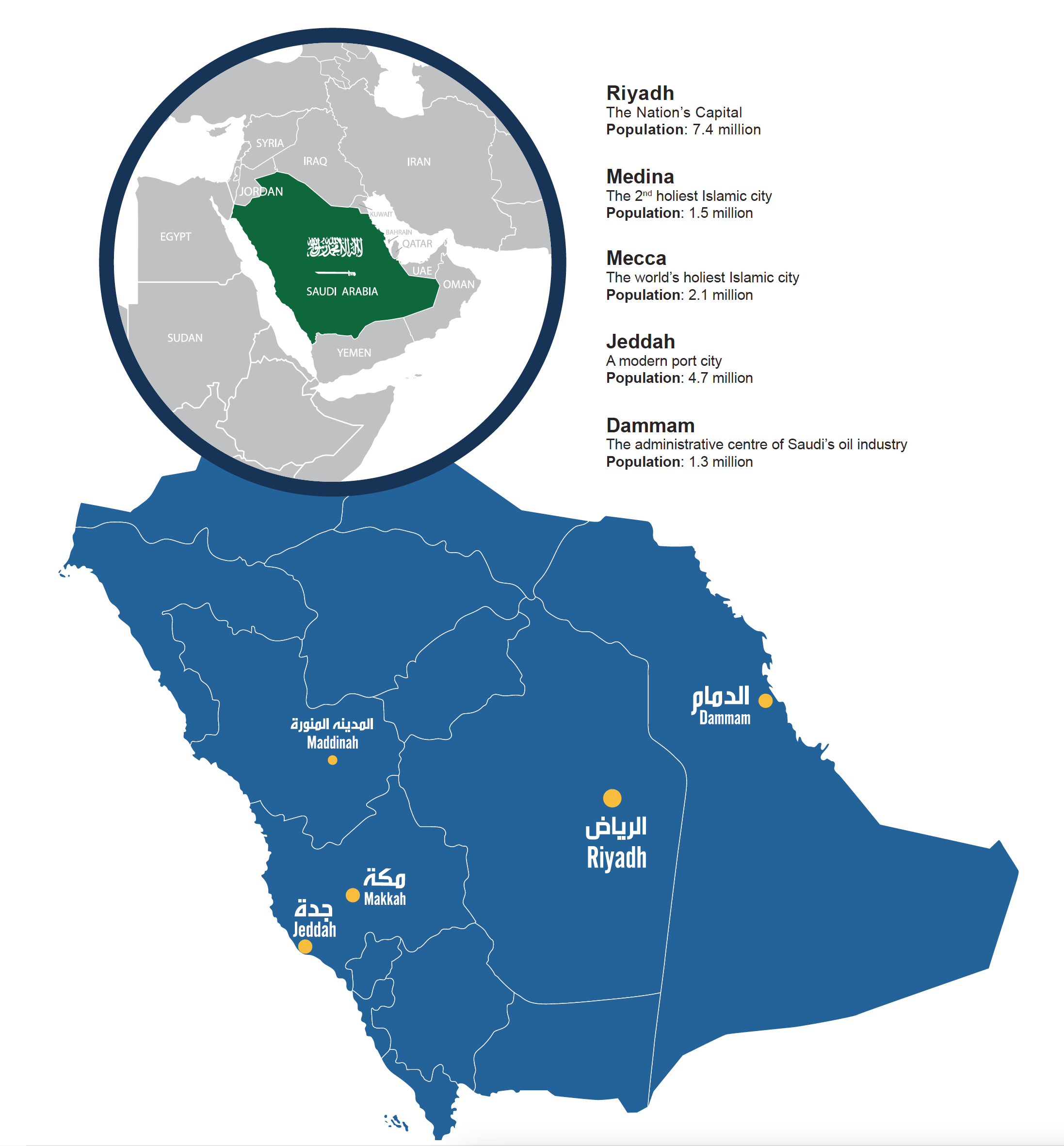10 Things to Know about the Kingdom of Saudi Arabia
02 October 2022•
As the Kingdom opens up more and more to the outside world, it is welcoming visitors from near and far. Saudi Arabia’s first ever tourist e-visa was introduced in 2019 and was inundated with requests in the first few months. Half a year after the Kingdom’s Grand Opening to the world, the world went through a Grand Closing – shutting down borders due to the pandemic. Now as the world recovers, Saudi Arabia is more keen than ever to attract and welcome more visitors.
Here are 10 facts about the Kingdom you need to know:
1. The Kingdom is Roughly the Size of Western Europe
The Kingdom of Saudi Arabia (KSA) sits in Western Asia, bordered by the Red Sea to the West, Jordan, Iraq and Kuwait to the North, the Arabian Peninsula, Bahrain, Qatar, and the United Arab Emirates to the East, and Oman and Yemen to the South. The Kingdom is the 13th largest country in the world, and the largest country in the Middle East; spanning nearly 2.15 million square kilometers, Saudi Arabia is roughly the size of Western Europe. It’s larger than Mexico, and is roughly equivalent to the size of Greenland. Saudi Arabia is also the largest country in the world without a river that runs through it. 95% of the country is considered desert. There are 13 regions in Saudi Arabia, with 19 cities of populations over 100,000 inhabitants. Its Red Sea coastline stretches over 1,760 km, while its Arabian Sea coastline stretches 560 km.

2. Saudi Arabia is a Wealthy Nation
Saudi Arabia is the 19th largest economy in the world, and largest economy in the Arab world. The World Bank classifies Saudi Arabia as a ‘high-income economy’ and the Kingdom is the only Arab country to be part of the G20 major economies. Saudi Arabia is also a founding member of the United Nations, Organisation of Islamic Cooperation, Arab League, OPEC and is a member of the Gulf Cooperation Council (GCC) states.

3. Saudi Arabia is an Oil Rich Nation
The Kingdom first discovered oil in 1938 and has since become the 2nd largest oil producer in the world, and the world’s largest oil exporter. It is believed that Saudi Arabia has the world’s 2nd largest oil reserves, and the 6th largest gas reserves.
4. The Kingdom is the 3rd Largest Military Spender in the World
It is the 3rd largest military spender behind the USA and China.
5. Saudi Arabia has experienced a Trade Surplus since 1968
Due to its oil exports, the Kingdom has enjoyed a trade surplus – meaning it exports more than it imports each year – since 1968. Its top trading partners are China ($45.8 billion in Exports, $26.5 billion in Imports), the United States ($12.2 billion in Exports, $13.4 billion in Imports), and the United Arab Emirates ($6.6 billion in Exports, $17.9 billion in Imports).

6. Saudi Arabia’s population is young and predominantly Muslim
Saudi Arabia has a relatively young population (35 million), with 67% of its population being under 40 years old. The population is predominantly Arab (90%) and the country is the birthplace of Islam, the 2nd most practiced religion in the world. Saudi Arabia is home to two of the holiest mosques in Islam, Mecca and Medina, and the Kingdom’s reigning monarch, King Salman bin Abdulaziz Al-Saud, is officially referred to as ‘the Custodian of the two Holy Mosques’. 93% of the Kingdom’s population are Muslims, of which approximately 90% are Sunni (orthodox) Muslims and 10% are Shia Muslims.

7. Saudi Arabia’s flag represents Islam, Peace, Life and Fertility
The Saudi flag is green, due to the color’s significance in the Islamic faith; green is thought to represent peace, life and fertility. The modern Saudi state, as we know it now, was established in 1932.
8. The internet penetration rate stood at 96% which is higher than the US’s 92%
Given its youthful population, the Kingdom also has some of the highest rates of internet and smart phone penetration. Saudi Arabia has invested in IT infrastructure over the past 10 years and has seen an 8.5% cumulative annual growth rate in internet penetration across the Kingdom between 2012-2019 to be able to provide internet access to 96% of its population. 8 out of 10 Saudis use some form of social media every day. Saudis are also the largest consumer of youtube.com videos in the world, per capita; in a 2014 YouTube revealed that more than 90 million videos were being viewed in the Kingdom daily!


9. The Jeddah Circuit is described as the “fastest street circuit”
The Jeddah Street Circuit was added to the F1 calendar in 2021 and is located at the Qiddiya entertainment complex. It is the ‘fastest street circuit’ and was the 2nd fastest overall circuit on the F1 2021 Calendar, with average speeds set at 252 km per hour. It is also the 2nd longest circuit (6.174 Km) behind the Circuit de Spa-Francorchamps in Belgium (7.004 km).
10. Camels are the Kingdom’s national animal
The largest camel market in the world is in Buraydah, Al-Quassim, Saudi Arabia. The King Abdul-Aziz Festival for Camels is an annual cultural, economic and entertainment festival backed by the King and Crown Prince, where participants compete for prizes up to US$66 million.

%2Fuploads%2Fsaudi-tourism%2Fsaudi-tourism-cover.jpg&w=3840&q=75)